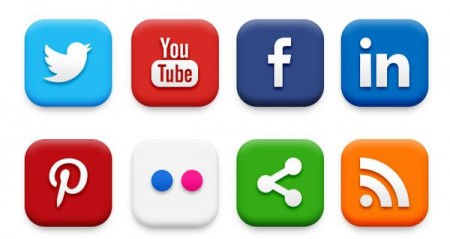What’s in a name? If it comes to Twitter, the answer is roughly $ 1.1 billion. In just four years, Twitter has grown from birdsong for most words in the English language, according to Global Language Monitor data for 2009. (“Obama” was second.) Twitter spokesman Matt Graves said his company’s name was flatly brilliant “the result of a brainstorming session among a small group of employees at Odeo, starting in San Francisco podcasting when Twitter started as a side project. They came up with possible names, including “jitter” and “Twitter”, and put them in a hat, “says Graves. Twitter won.
Now the race to piece the name of the next society oddly memorable. The challenge is to come up with something as powerful as Verizon or Haagen-Dazs (invented words have entered the cultural lexicon), not to mention Google (misspelling the founders themselves, the digital word “googol” ), has become even more difficult. There are over one million names, slogans, logos and office in the U.S. Patent and Trademark Office. And according to VeriSign, a global domain name registry, 11 million Internet domain names were registered in the past 12 months alone, an increase of 6 percent over the previous year. In all, 193 million Internet domain names are now available for new businesses.
“The days are incidental to appoint more,” said Naseem Javed, founder of ABC NameBank, a consultant based in New York specializing in the nomenclature of the business. To stand out in crowded market worldwide, “he said, the name a company must now be very strange. “Ten, twenty years ago, you can start a business and take the name in every sense,” he said. “Now, with 200 countries on the cyber platform worldwide Finding the right name has become an expert in the field. ”
More than ever companies are looking for professional advice on their identity. Although the number of customers are difficult to find, there are about 50 naming firms worldwide, the majority of them launched in the last decade, according to DMOZ, the Open Directory Project, the largest of Internet yellow pages. “It’s like modern art,” said Phillip Davis, president and owner of Tungsten Branding, a naming services firm in Brevard, NC “I study words. I saw the words inside. What could they become, what could they be formatted in, are they malleable? “He takes his job very seriously. “In our industry, we call [words] partially shaped vessel.”
One of the most popular trends of naming years, according to Javed, Google is the double-O derivative. “Many companies believe that the double-O gives them a kind of comfort level,” he said. “You have names such as Joost, Boost, Wakoopa, iSkoot, and Qool.” According to Javed, there is a guiding principle in the strategy of double-O. “Basically, you put the double-O in the center, then you drop a letter on the left and a letter on the right,” he said. “I hope this gives you some magic.” ABC estimates there are about 760 company names double-o in the world.
The real art of naming a business must be weird – but not too weird. Jay Jurisics, creative director at San Francisco-based naming and branding agency Igor, points to the array of companies that appear to have been assigned a random combination of letters: Xignux, Epizone, Spansion, Assurant, Primaxis, Qorus. “Although each snowflake is unique technically” Jurisch said, “in a snowstorm they all mix and mingle.”
An odd name with an idea behind it, however, may stand out: take hairyLemon, for example, a web development company in Christchurch, New Zealand. Graham Dockrill, co-founder hairyLemon, explains that the name comes from the Cockney slang for “here at eleven” – as in 11 hours, typically when pubs open in New Zealand.
“Would you say that” hairy lemon and I am meeting you for a pint when the pub opens, “he said. Technically, to drink in the morning has nothing to do with society itself, but attracted potential customers. Dockrill estimated that at least a third of companies hairyLemon name comes from. “People might look at three or four different companies, he said,” and they will take us because we have such a funny name. ”
Like those who have appointed Twitter and Google, the people behind hairyLemon had simply touch. Not all Namer do-it-yourself is such a success. In June 2009, Russian gas company Gazprom announced a joint venture with NNPC Nigeria, which has resulted in an offshoot company they called “NiGaz.” However, the merger of “Nigeria” and “Gazprom” has struck many Americans as more suitable for an NWA album of a Russian gas monopoly. Development of a name in the digital age, according to Davis Tungsten, is both art and science. His most famous invention is PODS, portable storage with short demand. The original name of moving company and storage has been Phones, but Davis thought it “sounded too much like a toilet.” A name like PODS, he says, creates a feeling of “what, tell me more “instead of” eh, I do not understand. ”
The biggest mistake amateur creators name, Davis believes, is overanalyzing the language. Fans can focus too much on linguistics and the number of vowels and consonants. “They are so grammatically inclined to regret their bigger picture,” he said. “They forget that it must be a story connected to it. Other people’s history, but the word is so awkward that nobody cares about history. They will say: “In America, this word means the god of business. Well, yes, but he won 16 and five syllables x and z be three.”
For those who do not have the capital to employ a professional, the Internet is now littered with generating business-free name. Not all are legitimate, others are actually making fun of you. In 2003, an advertising agency in London, The Design Conspiracy has launched a website called whatbrandareyou.com where visitors can type their “core values” (as “dynamic” or “passionate”) and corporate goals (as “world leader” or “client focus”) and the site put together a brand name custom. “We were laughing a number of rebrands ridiculous at the time, as Accenture and Consignia,” says Ben Terrett, a former member of the Design Conspiracy. He said that all 150 of “products” of the site names have been carefully designed to be as bland as possible. However, the case was so compelling that 20 of their false names – including bivium, Libero, and Winnovate – were registered as trademarks by real companies.
Views: 157



